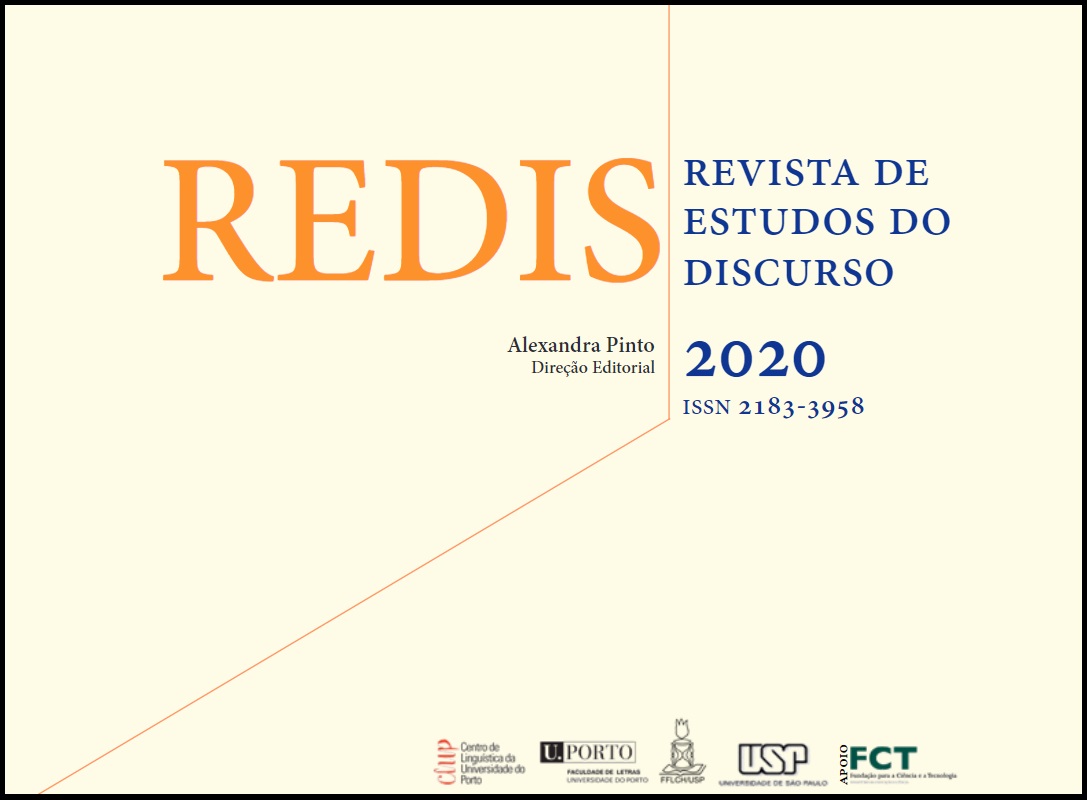Estratégias discursivas na construção do espírito nacionalista: a Hungria ‘de’ Viktor Orbán
DOI:
https://doi.org/10.21747/21833958/red9a1Palavras-chave:
Análise do Discurso, Nacionalismo, Populismo, Estratégias discursivas, Viktor OrbánResumo
O populismo, não só enquanto ideologia, mas também enquanto movimento político tem vindo a ganhar apoiantes e a ocupar uma posição de destaque na Europa e no mundo. Explorando “situações de crise (económica, social, política, religiosa, etc.)” (Galito, 2017: 13), o movimento populista ocupa já as principais posições políticas em muitos países, onde vemos surgir líderes como Donald Trump, Jair Bolsonaro, Boris Johnson e Viktor Orbán, para nomear apenas alguns. A sua retórica caracteriza-se pela exploração da dicotomia Bem-Mal, à qual se associa a oposição Eu/Nós-Outro e pelo recurso ao pathos aristotélico, onde os discursos argumentativos são pautados por argumentos apoiados na emoção que geram no Tu. Tendo em vista a persuasão do(s) interlocutor(es), os oradores socorrem-se de certas estratégias linguísticas que amplificam a força dos seus discursos. Essas estratégias deixam marcas bastante claras no material linguístico, e delas pretendemos ocupar-nos ao longo deste artigo, através da análise de um discurso anti-imigração proferido em 2016 pelo primeiro-ministro húngaro Viktor Orbán. Dessa forma, analisaremos as marcas linguísticas características do discurso populista presentes no discurso supracitado, elucidando, pelo menos em parte, a construção da retórica de Viktor Orbán.
Referências
Acemoglu, D., Egorov, G. & Sonin, K. (2013). A Political Theory of Populism. The Quarterly Journal of Economics, 128-2. Oxford: Oxford University Press, (pp.771-885)
Albertazzi, D. & McDonnell, D. (2008). Twenty-First Century Populism - The Spectre of Western European Democracy. Palgrave Macmillan
Anscombre, J.-C. & Ducrot, O. (1977). Deux mais en Français?. Lingua 43, (pp 23-40)
Campos, M. H. C. (1998). A modalidade apreciativa: uma questão teórica. In F. Oliveira & I. M. Duarte (Orgs.), Da língua e do discurso (pp. 265-281). Lisboa: Fundação Calouste Gulbenkian
Cap, P. (2008). Towards the proximization model of the analysis of legitimization in political dis-course. Journal of Pragmatics, 40, (pp. 17-41)
Charaudeau, P. & Maingueneau, M. (2002). Dictionnaire d’analyse du discours. Paris: Seuil
Charaudeau, P. (2011). Réflexions pour l’analyse du discours populiste. Mots. Les langages du poli-tique, 97, (pp. 101-116)
Dahlet, P. (1985). Un language efficaace: l’illocution - contibuition à une representation pragmati-que du discours publicitaire. Línguas e Literaturas, 2-1. Porto: Faculdade de Letras da Universidade do Porto, (pp. 343-347)
Duarte, A. R. (2017). O país onde o populismo continua impopular. Público. Consultado em maio 13, 2020, em https://www.publico.pt/2017/07/09/politica/analise/o-pais-onde-opopulismo-continua--impopular-1777639
Duarte, I. M., Pinto, A. G. & Salgado, S. (2019). Estratégias discursivas do discurso político populista em Portugal: Estado Novo e movimentos nacionalistas atuais. In A. Marques & S. Sousa (Orgs.), Linguagens de Poder (pp. 37-55). UMinho: Húmus.
Ducrot, O. (1990). Polifonia y argumentación. Conferencias del seminário teoria de la argumentacion y analisis del discurso. 1 ed. Cali: Universidad del Valle.
Evans, J. (2013). The Use of Othering in the Formation of a Nationalist Society. Academia. Consultado em maio 13, 2020, em https://www.academia.edu/1338990/The_Use_of_Othering_in_the_Forma-tion_of_a_Nationalist_Society
Ferguson, C. A. (1986). Overview. In E. C. Traugott; A. Ter Meulen; J. S. Reilly & C. A. Ferguson, On conditionals (pp. 3-20). Cambridge: CUP
Galito, M. S. (2017). Populismo - Conceptualização do Fenómeno. ISEG - CEsA/CSG. Consultado em maio 13, 2020, em https://www.publico.pt/2017/07/09/politica/analise/o-pais-onde-opopulismo--continua-impopular-1777639
García, L. F. (1999). Las construcciones concesivas y adversativas. In I. Bosque & V. Demonte, Gramática Descriptiva de la Lengua Espanola. Tomo 3 (pp. 3805-3878). Madrid: Espasa
Hawkings, K.; Riding, S.; Mudde, C. (2012). Measuring Populist Attitudes. Political Concepts. Com-mittee on Concepts and Methods Working Paper Series. Consultado em maio 13, 2020, em http://www. concepts-methods.org/Files/WorkingPaper/PC_55_Hawkins_Riding_Mudde.pdf
Lopes. A. C. M. (2010). Condicionais de enunciação no Português europeu contemporâneo. Coimbra: CELGA. http://www.uc.pt/uid/celga/agenda2010/acml
Lopes. A. C. M. (2009). Contributos para o estudo de construções condicionais não canónicas em Português europeu contemporâneo. Diacrítica, 23-1. Braga: Universidade do Minho, (pp. 149-169).
Montolío, E. (1999). Las construcciones concesivas y adversativas. In I. Bosque & V. Demonte, Gramática Descriptiva de la Lengua Espanola. Tomo 3 (pp. 3643-3737). Madrid: Espasa
Pinto, A. G. (2015). A retórica do Eu e do Outro - The Othering. A gramática da identidade no discurso político. In Z. G. O. Aquino & P. R. Gonçalves-Segundo (Orgs.), Estudos do Discurso: Caminhos e Tendências (pp. 25-53). São Paulo: Editora Paulista
Searle, J. R. (1979). Expression and Meaning. Cambridge: Cambridge University Press
Torre, C. de la. (2007). The Resurgence of Radical Populism in Latin America. Constelations, 14-3. (pp.384-397)
Wodak, R. (2001). The discourse historical approach. In R. Wodak,& M. Meyer, (Orgs.). Methods of Critical Discourse Analysis. London: Sage (pp. 63-94).
Downloads
Publicado
Como Citar
Edição
Secção
Licença
Direitos de Autor (c) 2020 Redis: Revista de Estudos do discurso

Este trabalho encontra-se publicado com a Licença Internacional Creative Commons Atribuição 4.0.
Os autores cedem à REDIS: Revista de Estudos do Discurso, o direito exclusivo de publicação dos seus textos, sob qualquer meio, incluindo a sua reprodução e venda em suporte papel ou digital, bem como a sua disponibilização em regime de livre acesso em bases de dados.




